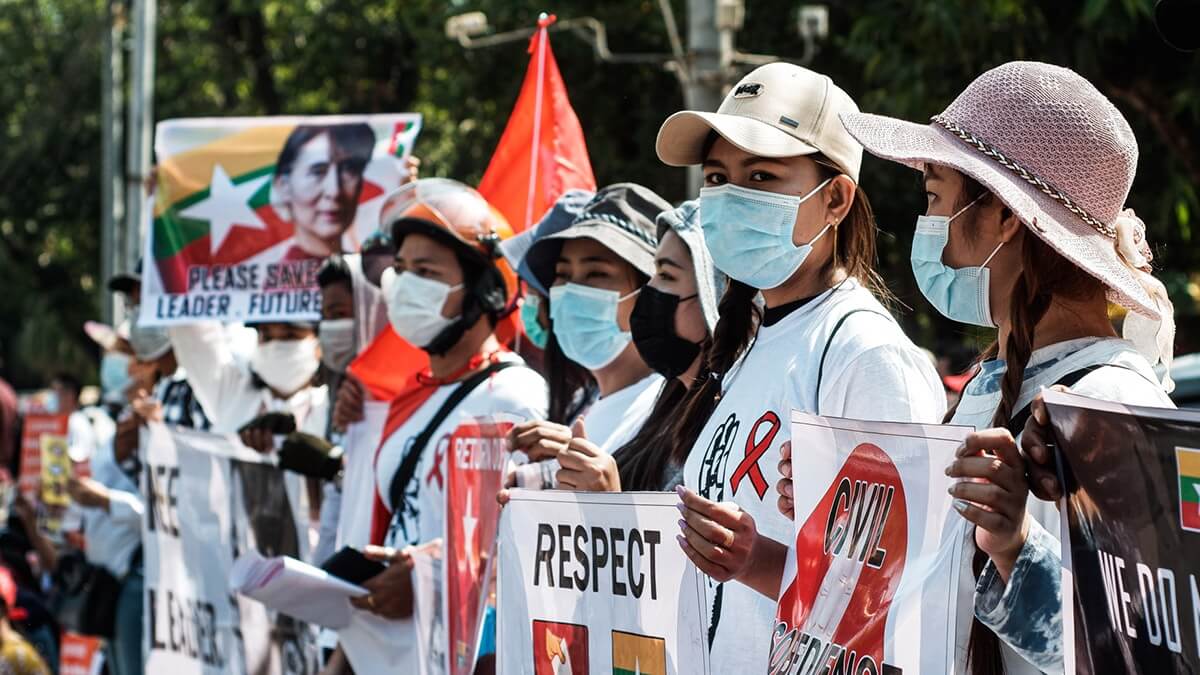Thailand hosted three Cabinet ministers from Myanmar’s military government for an informal meeting aimed at resolving the country’s enduring political crisis.
Naypyitaw’s delegation included Foreign Minister Wunna Maung Lwin, Minister for Investment and Foreign Economic Relations Kan Zaw, and Minister for International Cooperation Ko Ko Hlaing.
Its foreign ministry said in a statement that the delegation “cordially exchanged views on the matters of Myanmar’s cooperation with ASEAN for the implementation of the ASEAN five-point consensus.”
It also informed Thai authorities about the junta’s efforts to broker a ceasefire with ethnic militant groups. Furthermore, it said it continues engagements with political parties on holding free and fair elections.
#Cambodia's DPM & foreign minister will be in #Bangkok #Thailand to have an "informal consultation" for a "frank & candid deliberation on how to accelerate the progress" of having #Myanmar implement @ASEAN 5-point plan to resolve #coup crisis of 2 years #WhatsHappeningInMyanmar pic.twitter.com/GFpeJ9Qsk6
— May Wong (@MayWongCNA) December 22, 2022
It also defended the military’s crackdown against the People’s Defence Forces (PDF), the shadow National Unity Government (NUG), and exiled legislative body Committee Representing Pyidaungsu Hluttaw (CRPH).
It accused the three “unlawful and terrorist organisations” of targetting monks, nuns, civilians, and government staff and of attacking government buildings, schools, hospitals, banks, markets, roads, and bridges.
In this regard, it called on the Association of Southeast Asian Nations (ASEAN) to uphold international law, with reference to the Geneva Conventions, “denouncing” their activities and “discouraging any moral, material and financial support for the terrorist organisations.”
While there was no indication that the talks helped make any progress toward resolving the country’s crisis, Thai Foreign Ministry spokesperson Kanchana Patarachoke said “the open-ended informal consultation was meaningful” and that the ministers engaged “in free-flow and proactive discussions.”
#ASEAN chair #Cambodia defends informal ministerial meeting on #Myanmar in #Bangkok #Thailand, saying it was "very much in line with point 14" of @ASEAN leaders' 5-point plan review. Adds 5 participating nations had "open, frank & meaningful discussion" #WhatsHappeningInMyanmar https://t.co/PjiPnXT40N pic.twitter.com/l7FN4oYmPw
— May Wong (@MayWongCNA) December 23, 2022
Notably, much of ASEAN was absent from the talks. Out of the 11-member bloc, only representatives from Cambodia, Laos, and Vietnam attended the meeting. It did not include any representatives from Malaysia, Indonesia, the Philippines, and Singapore, the three members who have been most critical of the junta government.
However, Thailand has refrained from serious criticism and maintained good ties with the country’s military generals.
Referring to the absence of other ASEAN members, the Thai diplomat clarified that Thursday’s meeting in Bangkok was held on the sidelines of Thai-Myanmar bilateral talks.
“The consultation was a non-ASEAN meeting” and only “intended to complement ASEAN’s ongoing collective efforts to find a peaceful political resolution for the situation in Myanmar,” she said.
Meanwhile, a diplomatic source anonymously told Reuters that the Singaporean foreign minister had sent a letter to Bangkok specifying its objection to the meeting, as ASEAN had collectively agreed to exclude the junta from such events.
“Any meeting convened under ASEAN, formal or informal, should not deviate from this decision,” it said.
Press release on Cambodian FM attended a ministerial Informal Consultation on the situation in Myanmar, on 22 December in Thailand pic.twitter.com/5RpekD0HJB
— Office of Cambodian PM 🇰🇭 (@PeacePalaceKH) December 23, 2022
The latest meeting comes only days after the United Nations Security Council (UNSC) adopted a resolution that called for “the immediate end to all forms of violence in Myanmar and urged restraint, the de-escalation of tensions and the release of all prisoners,” including President Win Myint and State Counsellor Aung San Suu Kyi.
The resolution called for an end to violence in the Rakhine state and the return of Rohingya refugees.
12 members voted in favour of the document, while China, India, and Russia abstained from the vote.
Chinese Ambassador Zhang Jun said the resolution “lacked substance,” while Russian Ambassador Vassily Nebenzia said Myanmar “does not represent a threat to international peace and security.”
Indian Ambassador Ruchira Kamboj, meanwhile, called for “quiet, patient diplomacy,” and said the resolution “may entrench the parties in inflexible positions rather than encourage them to pursue inclusive political dialogue.”
Earlier this month, the UN General Assembly also blocked the junta from taking the country’s seat at the UN.
ASEAN, too, has also barred the country from participating in any of its meetings due to the lack of progress made in its fulfilment of the bloc’s five-point consensus reached last April.
Cambodian Prime Minister Hun Sen, ASEAN’s outgoing chair and one of its few members willing to engage with the junta, has said that resolving the conflict may take another five years.
“I predict that Myanmar takes at least five more years to sort out. If anyone thinks they have a good solution to that problem, they should go try solving it. I’m almost done with my term so the ASEAN chair’s special envoy isn’t going back to Myanmar,” he said last week.
Meanwhile, the NUG has urged the European Union and ASEAN to sanction entities selling aviation fuel to the Myanmar military, as it would “dismantle the junta’s capacity to inflict further atrocities on the civilians.”
Since the coup last February, it is estimated that more than 2,300 people have been killed, 15,700 arrested, and over one million people have been internally displaced. Meanwhile, ousted democratic leaders Aung San Suu Kyi and former President U Win Myint have been arrested. Suu Kyi currently faces nearly a dozen cases that carry a combined maximum sentence of more than 100 years in prison.

